#what happens when the caster's magic is depleted
Explore tagged Tumblr posts
Text
dance macabre
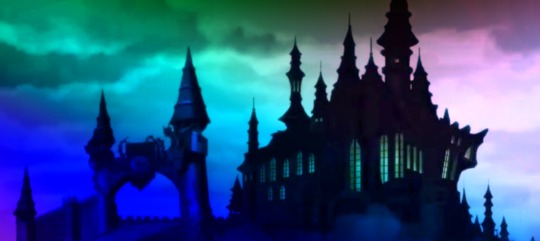

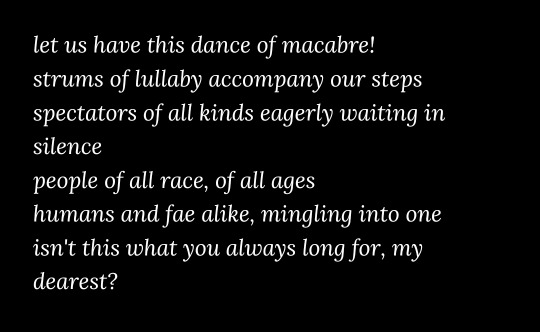
let us have this dance of macabre!
strums of lullaby accompany our steps
spectators of all kinds eagerly waiting in silence
people of all race, of all ages
humans and fae alike, mingling into one
isn't this what you always long for, my dearest?
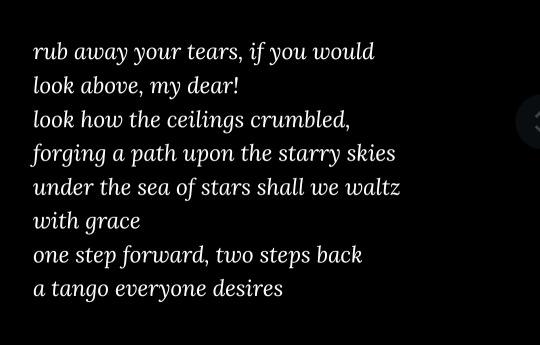
rub away your tears, if you would
look above, my dear!
look how the ceilings crumbled,
forging a path upon the starry skies
under the sea of stars shall we waltz with grace
one step forward, two steps back
a tango everyone desires
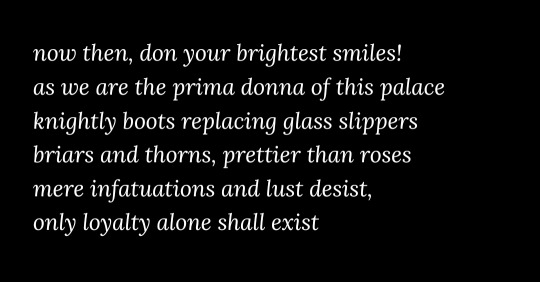
now then, don your brightest smiles!
as we are the prima donna of this palace
knightly boots replacing glass slippers
briars and thorns, prettier than roses
mere infatuations and lust desist,
only loyalty alone shall exist
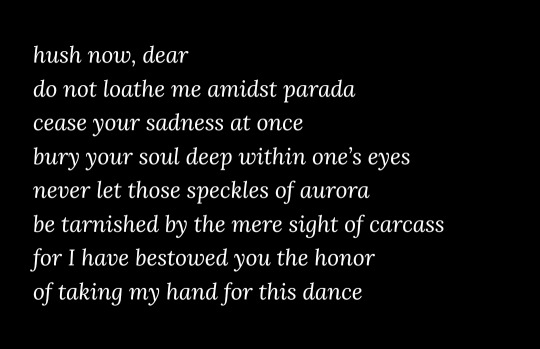
hush now, dear
do not loathe me amidst parada
cease your sadness at once
bury your soul deep within one’s eyes
never let those speckles of aurora
be tarnished by the mere sight of carcass
for I have bestowed you the honor
of taking my hand for this dance
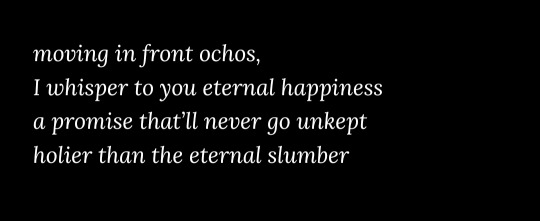
moving in front ochos,
I whisper to you eternal happiness
a promise that’ll never go unkept
holier than the eternal slumber
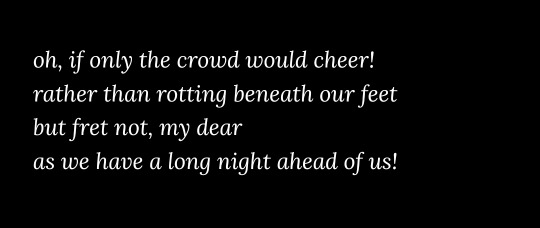
oh, if only the crowd would cheer!
rather than rotting beneath our feet
but fret not, my dear
as we have a long night ahead of us!

#tw // disturbing themes#malleus x silver#mallesil#malleus draconia#silver vanrouge#ths is basically the bad ending of book 7#where despite everyone's efforts they r unable to stop his overblot#leading him to exhaust his magic till none is left#what happens when the caster's magic is depleted#what'll happen to those falling victims of his um#no one knows#but here i hc them slowly rotting & decaying#stuck in samsara of dreams; their consciousness slowly slipping away as death seeps in#as his magical reserve are getting thinner his time-stopping barrier would fade as well#and mother nature will took over the bodies; decomposing it w/ no mercy#w/ the last bit of his magic; malleus used it to wake silver for one final dance#and voila! here we are#no; there'll be no magic saving us this time#malleus is lying yall theres no 'long night' they'll die approximately after twilight lololol#sorry not sorry#his magic just wouldn't last for both of them any longer#as for how much time had been spent before that? i leave it to ur thoughts :>#'why the cinderella reference diasomnia is based on sleeping beauty' hv u considered tht perhaps the author loves cendrillon#no the author certainly did not research on tango steps & watching how to tango tutorials wdym#miè writes ✍️#miè's poems#one more thing!!#unlike the prev ones- this one was actually made today!!#so enjoy while it's still fresh!! fresh outta the oven!! >:D#....ths is the last one for today i promise
19 notes
·
View notes
Text
Time to ramble about mana and magic! [Headcanon]
As stated before here, mana is the magical "energy" a cookie has in it's system, this working as a battery for magic in one's body.
It depletes when magic is used (The amount depends on the complexity of what's being done) and when it's low enough it starts to have reprecussions on the cookie itself, these being:
Exaustion and/or hunger
Inability to use more complex spells
it'll take longer to heal one's own wounds (When mana levels are normal a cookie's body will automatically heal any minor injury and seal major ones, while when depleted the body will wait for said levels to go back to normal, thus leaving visible scabs or scar tissue due to shortage of mana)
These symptoms of mana shortages get more intense the more severe the shortage itself is.
When a cookie overexerts itself by using too much mana their body will try to save as much as it can, forcing the individual to cast less consuming spells as when a critically low mana level is reached a cookie faints, it remaining unconcious until said levels aren't as critically low, this can last from a few minutes to multiple hours depending on the severity of the initial mana shortage.
How spells are affected by mana shortages
In spell casters (Wizards, healers,ecc..), mana shortages can also affect a spell's chance of failing or getting out of hand causing a magical outburst :
Magical outbursts are caused by a combination of high stress + low concentration and/or mana levels, these can happen in both shielding and attacking spells when a caster looses control over the strenght and range of a spell (This is seen trough powerful sparks being emitted from the source of a spell, these can harm both the caster and target of damage).
Spell failures produce weak and non-damaging sparks, but block the failed spell temporarely
Both of these effects (alongside very specific circumstances) can cause a cookie's defense mechanism to manifest their magic in a "cursed form"
Recharging mana
To recharge mana and get out of the depleted state breaks from magic usage and simple selfcare are enough, but the fastest and most efficient way to recharge mana is sleep (If the enviroment is ideal for a cookie's magic type the process is sped up significantly)

Cookies with the same magic type can also recharge one another at the expense of their own mana if so desired.
#beetle's headcanons#can you guys tell I'm obsessed with magic related hcs?#sjcnsn#A bit less illustrations this time as I made more for another headcanon I'm cooking up too#long post#cookierun#cookie run headcanons#cookie run kingdom#crk#cookie run hcs
60 notes
·
View notes
Text
Magic - An Overview
In the world of Lux Arcana, magic is an inherent component of matter - a basic force in the universe like gravity, magnetism, or electricity. People have learned how to access this force to make wondrous things happen through the arcane. Certain items and materials have more magical potential than others, and are thus highly valued for this ability, though the magical energy can be depleted by overuse - causing the object to become easier to damage or break. The process to replenish this magical energy varies from material to material.
Knowing how to differentiate what items have been spent and what items have not is a basic skill in mastering both magical disciplines, though the skill is more broadly useful with Arcana Res than Arcana Vita. Both styles ultimately pull from the same source, but scholars in the field feel as though neither is accessing the full potential of magic as a tool. Nobody has discovered another way to use magic, and neither style is more powerful than the other.
No matter which of the two magical disciplines you practice, it takes hard work and effort to improve. Natural talent can be a factor, but at the end of the day practice is paramount.
Arcana Res
With the right training, almost anyone can learn how to be a Resmage. However, Arcana Res is the style of magic that has the steepest initial learning curve because it has the most rigid rules for casting successfully. An unsuccessful casting can be anywhere from a minor inconvenience to life-threateningly dangerous depending on the magnitude of what the Resmage was trying to accomplish. A beginner will likely not have a good grasp on what is and is not an enormous undertaking, which is why rigorous study and apprenticeship is important. Along with that, Arcana Res cannot do the same things that Arcana Vita can and vise versa.
Arcana Res requires an external source of magic and either written or spoken symbols, the language of which doesn't really matter as long as the caster knows their meaning. Many eccentric Resmages have made their own words or writing specifically for magic, however, most just stick with their native tongue or an officially agreed upon system. You can often tell what school a Resmage comes from by how they cast.
Casting with Arcana Res is the most effective when working with nonliving material. Depending on region, some Resmages favor rare minerals, water, metals, cloth, or other such materials for casting. It's most useful for transportation, architecture, and material manufacture.
Arcana Vita
To become a Vitamage, one must first be naturally attuned to Arcana Vita. Without that natural intuition, becoming a Vitamage is both an uphill battle, and incredibly dangerous. It is vital for a Vitamage to have a good idea of their own limits. While most Vitamages have an easy time with the basics, gaining skills beyond simple spells does not have a clear, well-defined path.
Arcana Vita often draws on the Vitamage's own magical energy, especially for new Vitamages. Just like inanimate objects, a living being's magical energy can be depleted. If too much of the living being's energy is depleted, it can get sick and die. Vitamage training mostly focuses on increasing the user's ability to retain magical energy and knowing what their limits are.
Casting with Arcana Vita is most useful with living things, quite often starting with the Vitamage themself. Arcana Vita is most used for healing, body modifications, and food and livestock care.
As a mage gets further into their chosen type of magic, the lines between the two tend to blur. A Resmage can learn how to draw from their own power if they're sufficiently skilled, and a Vitamage can learn to draw from external sources.
Drawing the magical energy out of a living, unwilling participant is incredibly difficult, but if done right it can be used to kill. Study into this method of magic is widely considered taboo.
Terminology (Stellubric)
Arcana Res (ɑ:ɹkˈɑ:nə ɹɛz) - A way to access the magic inherent to nonliving things that requires rigorous study to learn.
Resmage (ɹɛzˌmˈeɪdʒ) - A practitioner of Arcana Res.
Arcana Vita (ɑ:ɹkˈɑ:nə ˈvitə) - A way to access the magic inherent to living beings that some people are in tune with naturally.
Vitamage (ˈvitəˌmˈeɪdʒ) - A practitioner of Arcana Vita.
3 notes
·
View notes
Photo

Magical Flow Through a Dragons System
because I have an addiction to infographics and I’m making that your problem
Magical flow is steady state. This is to say that magic is constantly moving in and constantly moving out. Ideally the the amount of magic being held is the same at all times. Like a beating heart, magical intake is involuntary and always happening, but outside circumstances can speed it up or slow it down.
The three ways through which magic are expended are, in order:
Support of Bodily Functions: The body will maintain and feed itself, fight diseases, regulate temperature, and heal injuries
Magic Casting: Magic can be expended deliberately in the casting of spells, pooling of reserves elsewhere, maintenance of nests, etc.
Discharge: Anything not used for these purposes is released in an involuntary discharge, usually in the form of a flare or halo, or in magically induced effects around the dragon (such as an ice dragon cooling the air around them)
I know these move kind of fast, but you can find all the frames and explanations of all of them under the cut~

This is what’s considered Normal magical flow. The amount of inflow and outflow is equal and it is distributed across the three functions as needed.

When living outside of one’s home elemental territory, usable magic is less abundant. Usually this forces the system to be less wasteful.

In territories where the primary ground magic is weakening to the element of the dragon, the weakened element may be more difficult to come by, forcing further efficiency to avoid overspending and pushing toward low reserves, or worse, burnout.

In the opposite case, closeness to one’s own deity increases the magical field of that element and increases the amount of energy being taken in. Usually this goes directly to discharge, but can be pushed to either of the other two categories as well. This is why Halos and other discharge effects are particularly common to see in areas around a flight’s seat of power.

Low reserves occur in the wake of casting magic. They can also result from lower intake conditions or magical illnesses. Here magical functions are weakened in order to rebalance the system.

Starvation, serious injury, or severe physical illness can cause all magical functions to shift to body maintenance.
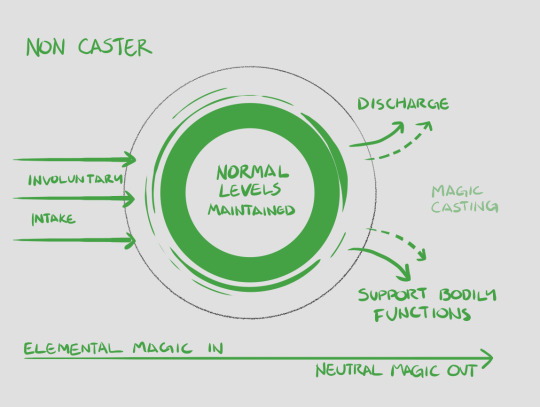
Those who abstain from casting completely may be trained in redirecting their reserves elsewhere. Those who are skilled in this can accelerate the process of healing and tend to be more spry and youthful.

When casting a large spell alone, all magical resources are diverted to that spell. During this time they will experience hunger, thirst, any unhealed injuries, etc. without the help of their magic to support them which can be jarring to the unprepared. If output exceeds draw, then it will leave the caster in a Low Reserve state.

A well trained and highly skilled mage can conduct a highly demanding casting alone. While the spell is being cast, Emergency Intake begins. Drawing extra magic from the environment can cause damage to anything magically fueled or maintained in the area including other creatures or entities. In cases where environmental intake is not enough, Reverse Draw can be used as a last ditch effort in which the body cannibalizes itself for energy causing permanent damage usually to the heart, lungs, eyes, and extremities.

One of the easiest mistakes to make during any casting is a Missfire. This happens when the caster loses control of the magic mid way through, sending anything more than their normal levels of magic directly to discharge. While it may not kill the dragon, it will often leave them severely burned, frozen, impaled, blinded, or otherwise maimed depending on the element of the magic being handled and just how much of it there is.

In more rare cases, loss of magical control can cause the energy to flow backwards and into the reserve pushing its size beyond what the body can handle at which point it is thrown into overdrive for a short period before simply shutting down. This can be done deliberately if what needs doing lies closer to the scope of a miracle, but the maneuver is always fatal and its considered an absolute last resort.

If both Emergency Intake and Reverse Draw are unable to keep up with demand, the amount of magic will deplete until the spell is somehow cut off, or burnout is reached.Here, the caster’s reserve is so depleted that the magical half of the system is unable to recover. Without it, the physical body goes into withdrawal and dies shortly afterward. In many cases, the spell will be cast as intended despite burnout.
Burnout can be non fatal if it is addressed immediately, but it cannot be reversed. The dragon will require an external source of magic at all times to keep them going, and will almost certainly never cast again.
#flight rising#fr lore#flight rising lore#worldbuilding#magical mechanics#magic system#magic#hopefully this makes sense
188 notes
·
View notes
Text
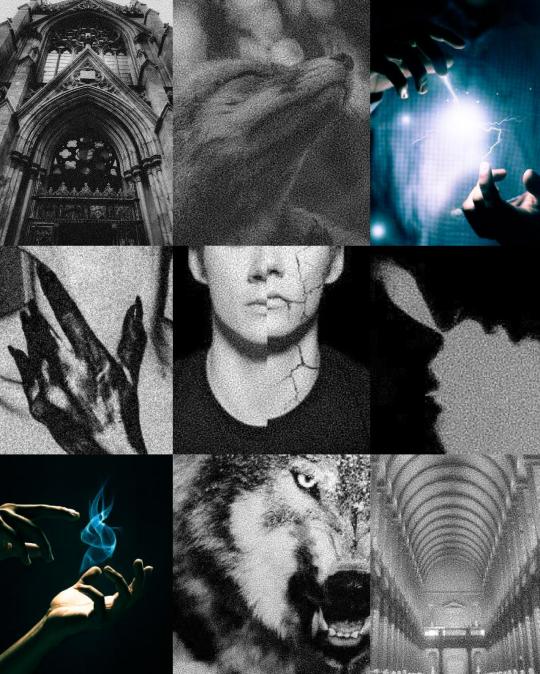
command me to be well
(a Beacon Hills Academy for the Supernaturals ficlet)
~•~
Supernatural creatures are known and accepted in society, and they have their branch and section in everything - the government, religion, court justice, health, food production, etc. They coexist with humans. There are still supremacist groups on both ends of the spectrum, but as a whole, supernaturals and humans share the world in equal.
In Beacon Hills Academy for the Supernaturals, mages (magic wielders) and shapeshifters (werewolves, werefoxes, were-coyotes, etc.) study and learn about themselves, strengths, and weaknesses, and adaptation in the human world.
Stiles takes both mage and shapeshifter classes. His mother had been a fire werefox, and his grandmother a mage. The magic ability stays dormant in between generations, so Stiles received the spark that skipped his mother. Stiles's dad is the Sheriff of Beacon Hills, Homo Sapiens division. (It's not what it's called, but Stiles uses the term to annoy his father.)
Every werefox can shift to their animal forms since birth. Their blood has no infectious components like werewolves, to turn an existing creature into one. So their kind only reproduces through procreation, but the power comes only between the ages of eighteen to twenty and never predictable. There are thirteen classifications of werefoxes: Heaven, Wind, Spirit, Fire, Earth, River, Ocean, Mountain, Forest, Thunder, Time, Sound, and Dark. And they all have to study every single one element through simulations and a weird practice called internalization. It's like the Buddhists' enlightenment when they have to "seek within themselves the core of their being" or whatever crap like that.
His mage classes are much worse. As a werefox, his reading skills are for shit, even with his human blood. His kind takes time to make sense of written symbols -it's called dyslexia in the human tongue- and so it proves to be a problem in his magic lessons.
"Stiles!" Kira, also a werefox and his non-biological sister, appears at his side after class. "Come over this afternoon and have dinner at home. Dad is making sushi."
The mention of sushi makes his mouth water, but he curls his lips downward. "I can't. I'm on my way to solitary study."
She winces sympathetically, "Yikes."
The solitary study is another word for detention in the Supernatural school. The students are put into confinement to reflect and read. It could be for an hour up to five -their offense and the amount of hate the teacher has for them decides the length of the stay. It doesn't sound bad when you hear of it the first time, but the stillness of being alone in a white room, being forced to think, drives everyone crazy. Stiles is probably the one person in the school who has seen those walls the most.
"What happened?" She asks, hoisting her backpack, forehead creasing intently.
Stiles shrugs, "In my mage class, we were practicing an incantation. I mispronounced a word because the symbols were flying all over the page," they stop walking when they reach the hallway that will separate them; Kira to the exit, and Stiles to his punishment. "All the light bulbs in the room broke simultaneously, and the shards went everywhere, mostly lodged in my classmates' and teacher's faces."
"Ouch,"
Stiles hums, curling his lips. "My incantation teacher hates me, just as much as I hate him. Every mistake I make is an excuse for him to send me to solitary. He also thinks I'm doing it on purpose. He gave me five hours today, and I'm expecting another tomorrow for the potion I fucked up earlier in another of his class."
"But that's unfair," Kira says, indignant for Stiles. "We're dyslexic. Every teacher should consider the limitations of each of us."
Stiles purses his lips but doesn't say anything. He doesn't mention to Kira that when the symbols rearrange in his mind, it's not always a gibberish mess. Sometimes, they're also perfectly readable -and quite harmful, depending on the caster's intention. He doesn't mention that more than half the time, he purposely utters curses and adds the wrong ingredients to concoctions. Stiles only does it for fun, though, to ruffle his teachers and enemies. He's a school jester; everyone knows that. He doesn't mean to cause pain to anyone -not all the time.
He's not vicious or vengeful. He swears he's not.
He's only a playful fox, curious with the less explored potentials of his power -even its violent capacity.
~•~
But it gets worse. It becomes an inclination more than a mere curiosity, especially when Stiles meets him.
In his fourth year in the Supernatural school, the management opened a program for the underaged supernaturals in the custody center. They're the young, homeless lawbreakers abandoned to the care of social workers after countless encounters with the law enforcement and their family's depletion of funds to cover the fines for damages they have caused.
The program grants them one term of attendance in the school instead of being instructed by tutors at the center, and a second one if the first term yields positive reports.
There are eight of them, and all are shapeshifters. There are three werewolves, a kanima, a wendigo, a chameleon, an electric eel (Stiles doesn't want to know how this kind came to be), and a were-coyote. All of them have criminal records, of course, but one has a count for murder - and his sister, no less. And Stiles knew him before his lock-up. They had not been friends because of Stiles's mistrust of canine shapeshifters, but he recognizes him right at first sight in years.
But while werefoxes prefer to stay away from the dogs, the latter doesn't have such urge to keep scarce, especially one among the outlaws: Theo Raeken.
He's taken one look at Stiles and decided to torment him. Witnessing Stiles do illegal magic did not help the case. Instead, it invited Theo more. Theo stalks him (as much as he can inside school grounds), stares at him, vies for his attention, pushes all the wrong but right buttons. Stiles feels repulsed by the way his blood thrums in Theo's presence. He's disgusted with himself for getting excited by his challenge. Stiles reminds himself daily that it's Theo -the one who murders their blood, and will probably have no qualms on staining their hands with someone else's. But Theo keeps provoking him, daring him to let go of caution.
One day, Stiles does.
He unleashes himself and leaves Theo bloody, beaten-up, broken, and exhilarated, and himself satisfied for the first time. Theo stops prodding him after that. He starts tempting him: We can run. None of them listens. Their truth is the only truth. And Stiles thinks he's right.
He's almost eighteen. His fox's element should be manifesting -and it looks like it is.
~•~
"What happens if I turn out to be the wrong kind?" Stiles asks Kira one night, in the middle of video game night at her house.
Kira is focused on the screen, but she echoes Stiles. "The wrong kind?"
"A dark fox,"
That pulls Kira's attention away from the screen quicker than they can run. Her eyes are wide with alarm when she presses pause and turns to Stiles. She opens her mouth but speaks nothing for a long time. It seems she's too shocked for words. Finally, she shakes her head. "You're not."
Stiles sighs, putting down his controller. "There's one out of thirteen possibilities that I am. It's little, but it's there nonetheless."
Kira scoots closer, holding Stiles's arm, her clutch tight. "Yes, but," she stammers, "there hasn't been one in a long time."
"Of course, there isn't," Stiles agrees, looking at Kira. "They're exterminated as soon as they present to snuff out any chance of gaining power and growing a second tail."
"But you're not one," Kira says forcefully, eyes suspiciously moist.
Stiles replies softly, "I enjoy causing mayhem."
She shakes her head hard, "We all like trouble, Stiles. That's sort of what we are,"
Stiles can't look at her eyes when he admits his truth, so he turns away. "I inflict pain," Kira freezes in her touch. "and like it. The sight of blood makes me sick but with pleasure. I-" he pauses, wipes the sweat that gathered in his nose. He swallows. "I want to get into someone's head and twist their mind. I have done it, and I want to do it again."
Kira draws uneven breaths beside him. Her scent has turned sweet with fear -and though it makes his stomach twist, Stiles inhales it, savors it.
Kira's voice quivers, "If you learn to suppress it-"
"If it can be suppressed and controlled, there would've been no vulpine law authorizing the killing of a nogitsune."
Kira bows her head in defeat, sniffing.
"My magic," his whispering voice is loud in her room, reverberating in its four walls. He's been coming here since he was a child. Who knows when and if he can have the chance again. "It knows what I might be. It flows in my veins with my blood, rushing when I'm doing what I shouldn't be."
They're silent for a long moment; Stiles refuses to meet Kira's eyes, and Kira strives to calm her racing heart. She doesn't recoil from her touch, even when she was afraid. Now that the fear has subsided, she moves to kneel in front of him and takes his face between her small hands, prompting him to face her. When he raises his head, Kira's eyes are glowing, fiery around the black. Stiles flashes his in response.
"If you are," Kira says, tone final and sure. "I'm with you. You're my brother, and I love you."
Stiles knows she will stand by her words, but he doesn't wish her to. Kira has a whole life ahead of her that she can't spend hiding a nogitsune or running with one.
Because Stiles will run, damn if he won't. He's not going down, and he won't let them catch him.
He leans his head against her hand, kissing the soft palm of it. He rubs his nose on the residual unease still clinging underneath her skin. "I love you, too."
And then he will come back invincible.
~•~
#steo#steo au#steo fic#steo ficlet#stira#stira brotp#teen wolf#teen wolf au#teen wolf fic#stiles stilinski#theo raeken#kira yukimura#BH Academy for the Supernaturals#supernatiurals are known au#stiles x theo#stiles and kira are bffs#void stiles#fics tag
92 notes
·
View notes
Text
Why Sherlock Holmes FGO is Sus: Theories and More
Before I begin, I’d like to give thanks to my wonderful friend for all the points, art, and info searching that have been made to produce this piece, I can’t appreciate you enough for the effort you put in. 🥺🙏💕
Alright now on to it!
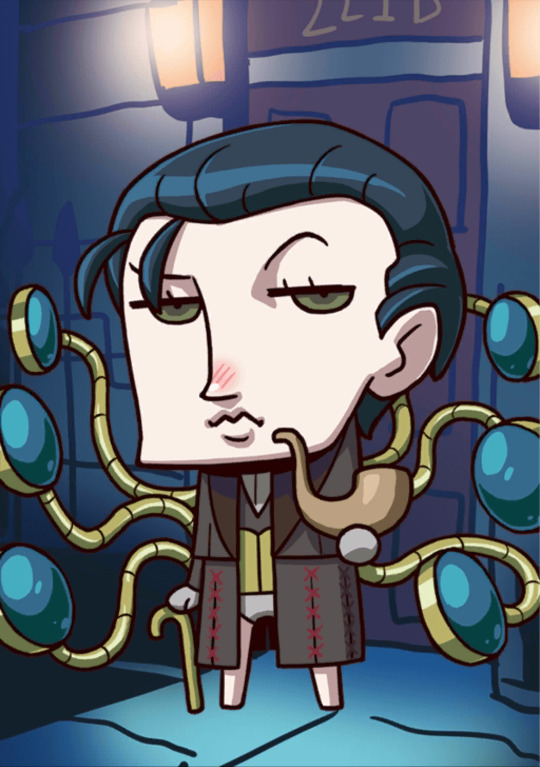
INTRODUCTION: Humble Beginnings (Identification of the Abnormal)
If you’ve played the app Fate/Grand Order for a while you’d know about the Heroic Spirit we first encounter in a hole within Camelot’s dessert whilst going to the Atlas Institute. Smart, handsome looking, and sharp enough to discern our True Name, this man of mystery has been seen as an oddball by many long time players of the game. There are many aspects about him that raise doubt about his credibility, is he truly what he wants us to think he is? That servant is Sherlock Holmes (Ruler) and there are many theories about him having some secrets, about him either being a Foreigner class, Beast class, or something else entirely. We are attempting to catalogue all this information in one place for maximum clarity.
SECTION 1: Other Character’s Reaction (First Impression is the Best Impression) *WARNING LOSTBELT 1 AND 2 SPOILERS AHEAD*
From the first encounter in Camelot right until the end of Lostbelt 2, there are many instances of characters reacting to his presence in….interesting ways.
Bedivere, when first coming in contact with Holmes in Camelot says that "I suppose I've never really been good with people like him. He reminds me of Merlin."
It could refer to the mysterious manner in which both Holmes and Merlin conduct themselves, but better to keep in mind that Merlin is a Grand Caster, and that he manifests as a servant due to specific circumstances (he is not dead).
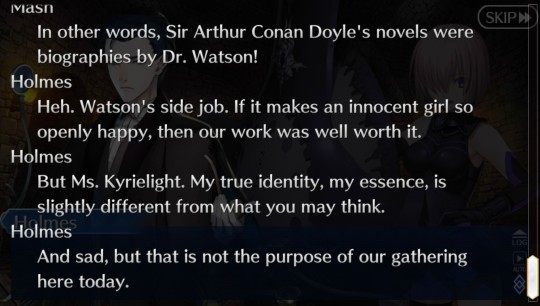
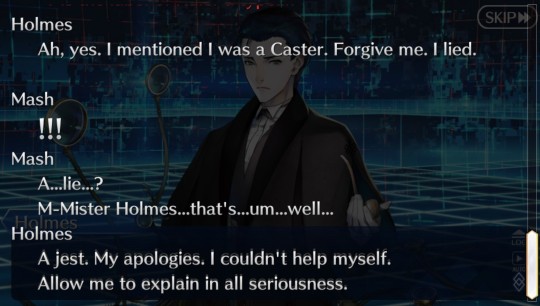
In Camelot, Mash assumes that Holmes must be Caster class and that the original novels by Sir Arthur Conan Doyle must have been biographies penned by Dr. Watson under a pen name. Holmes corrects her, saying that: "My true identity, my essence, is slightly different from what you may think. And sad, but that is not the purpose of our gathering here today."
This dilemma is also present in the Sherlock Holmes Trial Quest (which mostly tackles the debate of whether he's a fictional character or someone who actually existed). Holmes has a line where he says:
"Ah, yes. I mentioned I was a Caster. Forgive me, I lied."
This is however immediately followed up by:
"A jest. My apologies. I couldn't help myself."
This sort of backpedalling raises a doubt as to whether he was really Caster class before, so the nature of his former class is still a mystery. He later mentions that his Ruler class is the World telling him that not all illusions and dreams need to be laid bare.

When meeting with Salieri in Lostbelt 1, Holmes introduces himself as such:"I'm Sherlock Holmes, Chaldea's administrative advisor. I became a servant through unusual means, just like you."
Salieri was only summonable as a servant because of his reputation caused by the fact that he killed Mozart. He is under the effect of Innocent Monster. It can also be said that Salieri is a lostbelt servant and is significantly more sane than he would have been in a normal summoning, that was the unusual summoning that Holmes was refering to. Does this mean Holmes is not from Proper Human History?
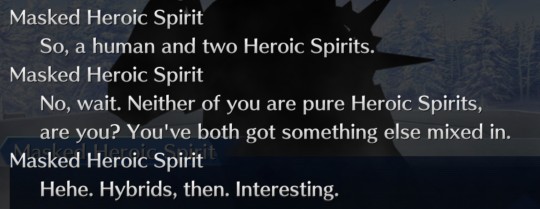
Sigurd (who's under the control of Surtur), while attacking us in Lostbelt 2 says this: "So, a human and two Heroic Spirits. No, wait. Neither of you are pure Heroic Spirits, are you? You've both got something else mixed in. Hehe, hybrids then. Interesting"
This is in reference to Holmes and Mash, who are alongside the master at this moment. Mash is a demiservant (human+servant) hence the "Hybrid" comment makes sense, but Holmes? What is the "something else" mixed in with Holmes?
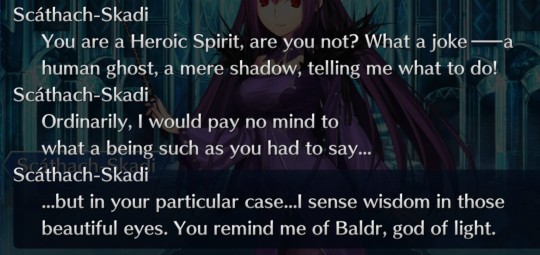

Later in LB2, Holmes requests the assistance of Scáthach-Skadi in beating Surtur. Skadi says that normally she would never pay mind to what a mere Heroic Spirit had to say but: "...but in your particular case…I sense wisdom in those beautiful eyes. You remind me of Baldr, god of light." Quite a bit later, she also has this to say:"Perhaps those piercing eyes of yours in fact surpass Odin's? Mystic Eyes, perchance? ….No, that's not it. They merely reflect your wisdom born of human history's cumulative accomplishments."
She says that's not it, but the fact that it was the first thing she thought of shouldn't be ignored.
Baldr is the god of light. Holmes' attacks consist of beams of light, and his cane lights up when he's using it in battle.
In Norse legends, Odin is said to have sacrificed one eye to the spring of Mimir in order to get ancient wisdom, the ability to perceive everything in the world.
SECTION 1.5: More Reactions (From JP Only)
Since it is JP only and there is no official translation for NA yet, this information cannot be 100% confirmed in any way. (Most of this is from Reddit translation done by fans). But as these are also important, it's best to put this information separate section.
Moriarty's interlude involves him finding a micro-singularity in London. At some point the transmission between Chaldea and the master gets cut and Moriarty reveals he created this scenario, made the singularity and everything to get one on one time with the master. He tells us not to trust Holmes. When the time comes, we as master should choose Moriarty over Holmes.
It has to be kept in mind that Moriarty is not a good guy, he is a character created entirely to oppose Holmes so it is natural that he doesn't trust him. For all we know, it is just emotional manipulation.
Moriarty's very nature is tied to being the antithesis of Holmes. Holmes might theoretically go against us for the sake of humanity while also trying to keep us safe (the master is in a way, a Watson replacement to him after all) while Moriarty would gladly let humanity burn for the sake of us but also for the sake of being completely opposite to Holmes and keeping his identity as such.
However he does raise valid points, how was Holmes able to rayshift? This part was never explained, and he also mentions that his hypothesis has a fatal contradiction in the fact that Holmes risked his life to save ours. What can be inferred from this is that Holmes is a good man and is on our side, but there is something very weird about him that should not be ignored.
In Lostselt 5 it is mentioned at one point that Zeus called Holmes dangerous, he mustn't look at Zeus or the other gods and that his eyes are enemies of the world.
It has to be mentioned that this is some heavy emphasis on Holmes' eyes (Skadi mentioned Holmes' eyes twice, and she was a god as well). Is it because of the nature of Holmes that he is the one that reveals all truth? Is that in some way detrimental to gods, magic and the world in general?
Recently, from Holmes' skill upgrade interlude there was a section about Holmes saying that he is always an ally of justice and that while he may be on our side, he is still capable of evil but it doesn't change the fact that he is our ally. Even then it seems he has some secrets that can't be understood by himself.
By now with the presence of Dr. Jekyll and Helena and their recounts on what happened, it is confirmed that Holmes was actually "alive"(?)
Some of the adventures penned by Dr. Watson were actually censored versions of the original happenings, which were magical in nature.
Holmes was traumatised(?) by Helena's death back when they were both alive. He swears he would never let that happen again. (remember what happened in lostbelt 2…)
It seems that Holmes himself is not fully sure of what is secret about him. Since he utterly dislikes talking about something without being 100% sure about it (this tendency of his has gotten us in trouble before) plus his general secretive nature, it can be said that this is why he wouldn't talk about that.
SECTION 2: Weird Things That Holmes Does (And Other Questions)
Heroic Spirits are anything but normal, but there are few servants who break the norm even further, and Holmes is one of them.
Holmes is able to Rayshift (presumably) from London, to Camelot, and then to Shinjuku. There are very few servants who are able to manifest themselves.
Musashi also appears here and there, but it's not a deliberate choice on her part. She is not able to predetermine her next destination.
Arthur travels from a parallel world to this world, but this is due to "chasing after a certain powerful antagonist, evil omen" - so he tells.
Beast class has the skill of Independent Manifestation which would allow the servant to manifest anywhere they'd want. Merlin, Tamamo Vitch and Shiki possess it. However, it has to be noted that Holmes' rayshifts have a significant toll on his saint graph, as he is unable to fight or defend himself by the time we meet him in Camelot. While normal Independent Manifestation shouldn't lead to the depletion of the user's saint graph. Holmes' class is unknown at the time of his rayshifting.
At the time of summoning, Heroic Spirits usually reveal their class and True Name (there also are exceptions to the rule). At the time of his summoning, Holmes doesn't reveal his Class: "Are introductions necessary? I am a detective. If you were expecting a hero, my apologies...But if you wanted a detective or an investigator, you drew the right card."
In the case of EOR Servants whose names haven't been found, they reveal their class.
Who summoned Holmes? The only thing we know regarding his presence was that it was first clearly there when he tampered with information in London.
Holmes' illustrator is Yamanaka Kotetsu, who was also the illustrator of the beasts Tiamat and Goetia
The artists who design and illustrate the characters tend to do it in groups of servants who are related to each other in some way (Pako with Arjuna and Karna Chacha and Nobunaga; Miwa Shiro with Brynhildr and Sigurd). It is strange that Kotetsu designed only Holmes, Tiamat and Goetia.
(NEW ADDITION) It should also be noted that as an illustrator Kotetsu has had previous works in a Lovecraftian Guidebook and is also the artist to the Alien God Preistess, somewhat showing how their work leans more to the outerworldly.
SECTION 3: The Design
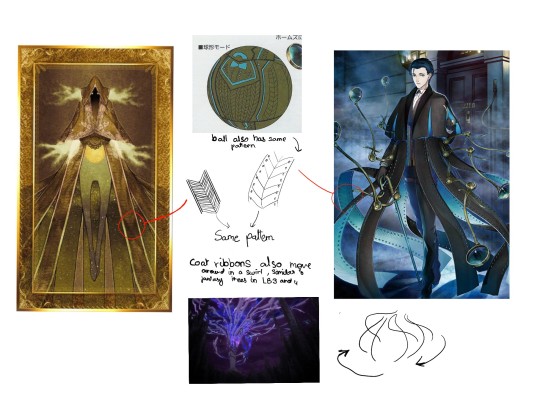
It is a very commonly noticed fact that Holmes' coat in his third ascension has a very similar shape to that of the Foreigner card artwork.
The pattern work on the coattails of the foreigner art and the inside (blue) part of Holmes' coattails have a very similar, if not exactly same pattern running down the entire length of it. The sphere summoned in Holmes' Noble Phantasm also has the same pattern on its sides and front.
There is a "fog" around Holmes in his third ascension, which is reminescent of the smoke in the card art. (Also can be the London smog).
The glowing section of the abdomen of the being reminds one of the metallic corset that Holmes wears.
There are 4 notches of smoke on either side of the being (total 8), under their cape. If we stretch our interpretation, then it could mean Holmes' arms and the metal arms that he has is also equal to 8.
In that tangent, the shape of the coat is also similar to that of Saver class Buddha, the fantasy trees from Lostbelt 3 and 4, and the Shadows made by the 6th imaginary element.
The Endless Knot / Shrivatsa symbol on his shoulders is one of the many references of his connection to Tibet (faking his death after the Final Problem). It is an important symbol in both Jainism and Buddhism.
Some of its interpretations include:
The eternal continuum of mind.
The union of wisdom and method.
Since the knot has no beginning or end it also symbolizes the wisdom of the Buddha
the endless cycle of suffering or birth, death and rebirth within Tibetan Buddhism.

The cane that Holmes wields has a pattern on its handle in the shape of a Prayer Wheel.
However, we are not able to find the meaning behind the script on the cane. Both of us attempted to translate it but failed. If anyone can translate the meaning it would be greatly appreciated.
The holographic books in the base of the unidentified sphere have a pattern on their front that greatly resembles a lotus.
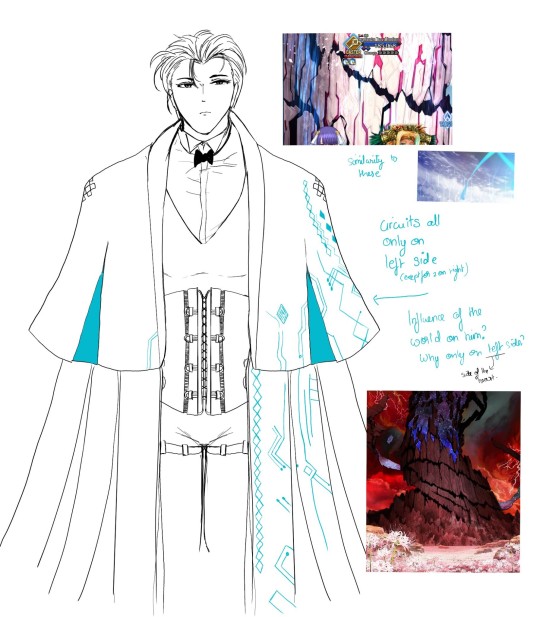
In Holmes' third ascension, there are a number of magical circuits on his coat.
The circuits are almost only on his left side, with very few circuits on his right side. It's not like it was woven into it, were that the case the circuits would have been all over his coat in a more even distribution. It's almost like an impact radius.
The circuits are very similar to the ones visible on the title screen of the lostbelts, as well as the patterns seen on the fantasy trees.
CONCLUSION SECTION: Something's Up (It's Big Brain Time)
It's clear that something is very strange about Holmes, from his interactions to his design, it's clear that there is too much effort into throwing these hints that it's not just a red herring.
Is he a Foreigner? Beast? Counter Guardian? Some other unknown extra class? It cannot be said at the moment. Holmes' role as a revealer itself is dangerous to mystery and magic, so it can be anything.
It is also not necessarily true that just because Holmes has all these abnormalities, that he will betray us, or is on the side of evil. When has there been a clear cut side of good or evil anyway? It can be argued that we are the villains in some way, as we bring about the end of these timelines to safeguard our own proper human history.
Holmes has always been on the side of humanity and will continue to be, the question is what the reveal will be, why and how. That, only time and future chapters can answer, all we can do is speculate.
#fate#fate grand order#fgo#Sherlock Holmes#lostbelt spoilers#foreigner theories#fuccyoutumblrfuccyoutumblrfuccy#hope yall enjoyed!! feel free to give yalls thoughts!!#and again thank you soso much fremd🥺🥺🥺🙏🙏
278 notes
·
View notes
Text
Magic in Mistren (Part 2)
When I wrote part one, I was a little rushed. Let’s see if I can fit the rest into this part.
Spoilers: I needed one more part after this one.
Anatomy of a Soul
A soul has three known parts, according to scholars in Mistren. They have a core, which is essentially the person themself. Their higher consciousness. Nobody knows what goes on in the “core” of a soul. That’s where everything profound happens. The “core” is basically the self.
The second part of a soul is the tether. It is what can best be described as a cord of energy that “tethers” the soul to the body.
And lastly, is the surrounding shell of magical energy. The core of the soul produces magical energy all the time, through a process entirely unknown. The energy envelops the core like a swirling mist, and can be harnessed to cast spells. However, casting too many spells too quickly, or casting extremely powerful spells, can use up the energy.
Consequences of Using Too Much Energy
Once the magical shell of energy surrounding the soul is depleted, it is always recommended that a caster wait around ten hours to allow the shell to completely regenerate before casting more spells.
A mage can continue to cast spells even after the shell is depleted... However, forcing the soul to quickly produce more energy tires the caster. Sometimes using energy from the caster’s body and thus causing their body to wither away very rapidly. Eventually, the soul will use the energy from the tether for one last spell, after which the caster immediately dies, for there is nothing connecting their soul to their body anymore.
After death, if the individual wishes to request a god to reincarnate them, they must wait for the tether to regenerate, which may take anywhere from two to fifteen years.
How much magic can be used before the shell is depleted?
It varies depending on the caster.
Individuals with stronger souls (generally wise individuals, people who seem to bounce back from trauma easily, and ones possessing impressive strength of will) can naturally cast a few more spells before depletion than those without strong souls.
Additionally, casting spells every day does increase the number of spells one can cast per day. The core seems to understand that it must gradually increase the energy produced for the shell when the caster uses all its magic every day.
The general rule is that the average person begins only being able to cast two relatively weak spells per day. Not including spells which are so weak that they barely take a cell’s worth of energy, which can be cast as many times as the caster would like, without expending any energy (generally, these are called cantrips.)
Individuals with stronger souls may be able to cast four or five weak spells a day from the beginning of their training.
Innate vs. Learned Magic
Every soul is different, as is the magic produced by the soul. Innate magic is magic that is naturally produced by the individual’s soul. For instance, if one individual naturally has an affinity for fire magic, then that is the form of magic their soul assumes. Without the use of spells, they have limited pyromancy.
(Note: “Non-magical” mortals are called non-magical because they have no innate magic. That does not mean that they have no shell of magical energy, but rather that their magical energy is somewhat of a magical “vanilla mode.” It doesn’t take shape into an effect unless the caster uses a spell.)
Spells are used to mold the soul’s energy into a different magical effect, such as a charm. This is Learned Magic.
Enchanted Items
The core of a soul cannot be captured by any means, as it is the very being of a person. However, the energy shell CAN be harvested, either upon the individual’s death, or with their consent.
Using this energy, a mage may create an enchanted item. The effect of the enchantment depends on the caster’s innate magic, and the strength of the enchantment depends on the skill of the caster, and how much magic their core produces per day.
Examples of enchantment:
The energy of an individual who innately uses ice magic may produce an enchantment that allows the wearer of the item to bypass another creature’s frost resistance when casting ice-based damaging spells, or resist the cold and effects of frost spells themself.
The energy of someone who innately uses charm spells may create an enchanted item that gives the wearer more charisma.
A mage may use their own energy to produce an enchanted item that optimizes their innate magical ability. Such as a pyromancer using their energy to create an item that allows their own fire spells to bypass another creature’s fire resistance, or magnifies their fire to do much more damage or burn hotter than before.
Weapons may also be enchanted to have certain additional effects when they land a hit, such as burning the opponent, or freezing them solid on impact.
Creating enchanted items is incredibly difficult, and it requires a very skilled caster to create them.
As a final note, you might think that the energy of a non-magical mortal would be useless for enchanting, considering that they have no innate magic.
Actually, the “vanilla” magical energy has uses for enchantment as well. Such as a measure of resistance to all spell effects cast by spells of certain levels of strength.
A Note on Charms
-Charm spells only work if the caster’s willpower can overcome that of the target.
-If the caster fails, then the target automatically knows that the caster tried to use a charm on it.
-If the target does not see the mage casting the spell (using the words and gestures) then the mage has a small advantage over the target, almost like the target has been caught by a sneak attack.
Magic and Gods
-Any spell cast on a god automatically fails unless the caster is either another god, an entity on the same level of power, or someone blessed by a god.
-Gods can cast at least 10,000 spells a day of any power level. You may be surprised by how often they need to cast that many spells in one day. For instance, if a plague sweeps across a nation, and a god wishes to eradicate it, each person cured of the plague would count as one spell being cast. In this situation, 10,000 spells isn’t nearly enough.
-There are laws that gods follow. For instance, since gods are technically less restricted in magic than weaker beings (an elf or demon would have to collect many tens of thousands of dollars worth of material components such as precious gems to, say, bring someone back to life, and would have to be powerful enough to be able to expend an enormous amount of magical energy without immediately dying themselves, whereas gods would only have to cast the spell as any other normal spell) there are laws about when they are allowed to cast spells that interfere with the natural order of things. I’ll go more in depth about that in the post where I cover the gods.
-Gods might limit themselves on magical power. Since gods are usually born as gods, some don’t enjoy having the measure of power that divinity brings.
-Gods are only able to bless up to two individuals at once. A blessing from a god is not the same as being a cleric of a god. Clerics get magical power from a god, but being blessed by a god gives benefits.
A blessing grants someone:
The ability to cast spells on gods, and have their magical weapons deal damage to gods. Basically putting them in a position where they could fight a god, although it would still be a monumental task to do lasting damage to one, or to kill a god.
The power to traverse the planes of existence without expending magical energy to create portals.
The ability to see into another creature’s soul, and sense their true motives and moral alignment.
The ability to see through shape-shifting and invisibility spells.
Immunity to the magic of the realms of immortals. (The magic of the realms can imbue an individual with the very essence of a place such as the demon realm or the fey realm. Only mortals are subject to these effects. A demon can spend as much time in the realm of the fey as it pleases and never become fey-touched, for instance.)
8 notes
·
View notes
Text
Primevals Worldbuilding: Failsafe Spells
Failsafe spells are extremely dangerous, unpredictable spells in the world of Primevals.
Purpose
Failsafe spells are used to prevent the death of an individual or (theoretically) group of individuals.
Mechanism
As Failsafe Theory was a very new area of study and failsafe spells were very rarely used, many details of the exact mechanism of and variables affecting a failsafe spell were shrouded in mystery at the time of the Shattering. However, a few mostly concrete and common factors did begin to emerge.
On the occasion of a failsafe user’s death, they will seem to simply disappear. In actuality, failsafe spells prevent their user’s death by removing the individual(s) from this universe at the moment of their death, storing them in a form of stasis in an unknown plane or space. Part of the energy required for the spell is used to shield the caster from the effects of the unknown realm they were transported to, creating a small pocket of “normal” space (in which normal refers to constrained by this universe’s laws of physics). The caster is not conscious during this period, only becoming so once they reappear in this universe or their “pocket” fails.
Ideally, a failsafe spell returns one to this universe relatively shortly after their death, with most perfectly prepared spells causing the caster to reappear within weeks or months.
More on the exact circumstances of one’s reappearance can be found under Complications.
Usage
Correct usage of a failsafe spell is highly difficult. They require an extremely large amount of magical energy-usually at least enough to deplete a mortal mage’s reserves for the next several weeks. The spell’s activation itself is actually fairly simple-the main difficulty in casting a failsafe spell (aside from the aforementioned drain) is in eliminating possible variables. Failing to do so will make the spell unstable, and, seeing as the spell affects the user’s life and the fabric of space and time in an area, generally produce extremely negative results.
Complications
Failsafe spells are almost more famous for their finickiness and potentially catastrophic consequences if miscast than for their effect. Their very nature means that they affect the caster’s life and the fabric of time and space in an area. This, coupled with the fact that they take a large amount of power to prepare, makes them very dangerous when performed incorrectly. Known side effects of miscast or hastily-prepared spells are as follows:
Complete failure: Occasionally, the spell will simply not take, with the magic dissipating into the surrounding area. If the caster is lucky, they will be unharmed, and they may attempt the spell again. If they are unlucky, the prepared magical energy will fail catastrophically, destroying everything nearby (likely including the caster).
Warping: If the proper precautions are not observed, the entity that reappears will not be unchanged. They will have been uninsulated in the unknown plane of the failsafe spell, which will result in catastrophic and unpredictable effects on their body, mind, and magic. This almost invariably leads to the entity that reappears being incompatible with this dimension and dying immediately. Those that do not die...would wish they had, if they were able to wish. See Notable Uses for the worst known outbreak of Warping.
Requisites: Occasionally a failsafe spell’s caster will appear in a “partial” state, with a requirement needing to be met before they regain their full form. The person will always know what this requirement is. Some cases include appearing as a separate consciousness in another being’s mind, with the body of the caster being a lifeless husk.
Tearing: Occasionally a caster will simply appear in pieces, dying immediately.
Notable Uses
Failsafe spells are rarely used due to their difficulty and potentially catastrophic consequences if misperformed. However, enough have been successfully used to present a number of notable cases.
Iveshan The God of Animal Life was one of the individuals who prepared a failsafe spell in the event of the War for Tevvyra going badly, which activated when he was killed in the Shattering. He rematerialized roughly 50 million years before present day.
Istevir The Goddess of the Oceans and Aquatic Life was another who prepared a failsafe spell during the Tevvyra War. As far as can be told, the spell was successful. However, no sign of Istevir has been seen since the end of the war, leaving the circumstances of her reemergence, if it has happened, unknown.
The First Failsafe Legion This is the best-known example of a failsafe spell being used to preserve multiple people. Anticipating the possibility of her defeat, Siirem enacted a powerful failsafe spell on one of her most powerful legions, led by Forest Lieutenant Velsiniir. It apparently worked flawlessly, as the Failsafe Legion would go on to wage war against the holdout communities, with the conflict the being the one that destroyed the communities and truly ended the Katrasseir civilization.
Those Twisted by the Raw Plane The worst example of a Warp incident was that which took place immediately after the Shattering. At least thousands of people hastily attempted failsafe spells to escape the Shattering. As most of these were either not skilled enough or too pressed for time to properly prepare the spell, many returned after being exposed to the raw plane. These entities menaced the holdout communities in the years after the Shattering and were one of the contributors to their eventual downfall.
Siirem Siirem is believed by some to have enacted a failsafe spell before her death, with some even going so far as to claim that the burst of power that caused the Shattering was a failed attempt at a Failsafe spell and unintentional on her part. It would transpire that Siirem did indeed enact a powerful Failsafe spell, though the Shattering was intentional. Siirem’s consciousness would appear in the mind of a human woman named Jen, with her drawback being that she needed to kill the vessel to release herself.
EDIT: Forgot tag list
Tag List: @unnameablethings @from-ashes-they-rise @midnightkitten @dawnuchiha @power-of-ages-writeblr @killer-badass @pearl-writes @little-dipper-holds-the-world @bluenightfire @chaos-reign @fathington @ramblingsofabourbondrinker @minny-king @eyelessfatdragon @problematicauthors @strawberryspaceship @thatpaperlife @oceansbooks1 @acottenwrites @thejadewizard-is-writing
8 notes
·
View notes
Note
pippa owns a small secluded cottage in the forest/countryside and invites hecate over for the weekend
so fun story, I sat down and wrote two whole other sections of this theme before I decided to focus on she/they high femme nonbinary Pippa Pentangle and their home away from the castle (which they’ve secretly always wanted Hecate to be a part of), and idk if the parts mesh together into one fic, so y’all get this one on it’s own for the moment
Pippa Pentangle(/Hecate Hardbroom), 1.5k+, teen. CW: references to nonbinary exclusion, few references to transphobic rhetoric (hmu if i’ve messed anything, this is an area of writing i’m unfamiliar w), gay pining (when isn’t it?)
Pippa has a cottage, a few hours away from Pentangle’s, more hours away from Cackle’s, the furtherest away from Hecate, in the middle of both then off to the side, on the farthest edge of Darkwood and a few miles more: a strange sort of diamond that spans across the coast to encompass the woodland of the country side.
It’s in the middle of clearing in the heart of the forest, hidden far away from prying eyes and further away from the responsibilities they spend their days fulfilling, upholding, taking up themselves to push herself and the students to become the best magic casters they can be.
Pippa loves Pentangle’s dearly, but sometimes they just need to get away.
And she’s had it for years, decades—a home to come back to, while they worked their way up and down the country moving from teaching position to different school, never quite finding her feet on solid ground in any of them.
It was hard, in the earlier years of their career: the more traditionalist academies hated Pippa’s disregard for rigidity and blind obedience towards authority, while the schools that claimed modernity, that Pippa had hoped were more their style, still clung to assumptions Pippa had long since realised simply weren’t necessary.
Like keeping witches and wizards segregated to limit the possibilities of what magical children could grow up to be.
That’s what get her fired from her last position, before they took over Pentangle’s when their Aunt had passed away a year later and entailed the family school to Pippa.
‘Absurd,’ the headmistress had said. ’Of course you can’t teach wizards witchcraft, what utter nonsense.’
She’d practically laughed Pippa out of her office, in the wake of Pippa’s request to take on a new applicate from a nearby town: a young boy whose magic didn’t seem to sit right in the school where an old friend was the school nurse. An old friend who’d thought of Pippa when the wizard kept coming into the ward with depleted energy and almost not casting to show for their spent magic, and there was nothing she could do to help them.
Pippa had been desperate to help, positive they knew the root of the young caster’s problem, but no one was willing to listen, no matter how much they begged. The headmistress had demanded Pippa’s resignation not long after, citing a pile of complaints made during Pippa’s time at the school, from parents with problems with their teaching methods, the results, the way they introduced themselves during parent’s evening.
It was the last one that truly stung.
Pippa almost spat in the witch’s face before packing her bags and leaving the grounds: the staff had known what they were getting when they hire Pippa, they’d never hidden who they were, never shied away from curious, harmless questions about their dissertation—still making waves more than a decade on—and the witch who wrote it. And what drove Pippa’s research in the first place.
But no matter how much the rest of the teachers listened, very few of them every really understood. And even fewer really cared.
So, Pippa left and never once looked back at a society that kept magic casters divided to make sure there was nowhere welcoming for the type of witch they’d become.
They made a quick detour to visit her friend on the way, to offer their services to the wizard in her care, before coming home to the cottage their great-grandmother entailed them a decade ago.
It had been a bit drab, when they’d first inherited it. Dusty like it hadn’t been used in half a century (67 years, to be more precise, since Great Aunt Petunia, the famous family hermit, had passed away and left it to Pippa’s grandmother), decorated like it was the 80’s—1880’s, that is—and Pippa always was more of a twentieth century sort of person.
The first thing they’d done was redecorate the whole house, inside and out: painted the exterior champagne and pale with blue trim on the window panes, the inside peach sweet and light and adorned with long velvet curtains in warmest purple (they’d considered a crushed pink, when they were deciding on decor, but there was something about the purple that caught her eye. They thought it blended well with the red of the armchairs by the fireplace, at first; it took almost a full year to realised it was the colour of Hecate’s sash when they were at school).
They’d installed bookshelves along every wall, bare and empty at first, but swiftly filled to the brim with tomes and textbooks and grimoires: ancient texts that ground their research, studies that reach all around the globe with broaden it, newer text to further it. A balance between the ideas that delight her, and as many that contradict: to be as thorough as possible, of course, by putting the skills she’d developed when she was young and determined to find a suitable, useful gift to give Hecate every year, so she could see her best friend smile.
Pippa knows why they’re drawn to the most archaic of texts and does her best to forget (they don’t need to anymore: the biggest gift of all).
Nonetheless, their collection grew. More so with her first pupil: in Pippa’s care for a year, where they watched the young caster bloom with promise, until her Aunt had died.
He’d been Pentangle’s first new enrolment, coming with Pippa as they took over as Head Teacher; their first graduate, too, and Pippa couldn’t be prouder of the caster they grew up to be, the youngest member of the magic council.
But as proud as Pippa of all the students in their school, that doesn’t mean they never needed time away. And when she does, Pippa comes here, to her home away from the castle, with only Artemis to keep her company, usually perched high on the extra armchair Pippa really doesn’t need, no matter how fond her familiar is of it, especially given he has a handcrafted tree of his own, (and if the trunk of Pippa’s creation also happens to be a scratching post, it’s simply to keep her birds claws in check, nothing at all to do with the needs of any other familiar. Certainly not).
She used to have chickens, once, in a coop along the far side of the house. But when Pippa took over Pentangle’s they soon realised the longer hours required she be on-site, that taking paperwork with them wherever they went really wasn’t an option, and it simply wasn’t feasible to keep the brood caged away with no one to care for them.
So Pippa brought them back to the school during the first summer holiday. Set up an area on the east side of the castle, the expanse of overgrown grass that no one ever seemed to be able to tame or replace, where Pippa added few trees for shade and a dash of magic to help things along and made them all the beginnings of an orchard.
The teachers hadn’t known what to make of it, yet one more new thing to accept now that Pippa ran the school, but the students had loved it, even more when new chicks hatched, and their collection of fowls had almost tripled in the space of one spring.
The goat had been their Deputy’s idea, and by the end of Pippa’s second year at Pentangle’s the school had the makings of an entire farm, a vegetable patch even bigger than the one Pippa has at home.
They hadn’t realised why they needed such a huge patch, why she’d plotted but never planted. Why they just let it grow whatever it wanted. Not till that tried to tame it, stripping it back in time for the spring break and Hecate impending visit: the reason Pippa had made it in the first place.
Because it’s always been Hecate, even when Pippa thought she hated her: the colour of her curtains and the extra chair by the fire, a quite wilderness just outside a kitchen stocked like a baker lives in the same cottage Pippa has spent half their life perfecting.
And it is, perfect: almost, that is. Almost perfect with it’s always burning fire and enough books to keep even the most particular of occupied on rainy days, and a calendar on the wall that that marks nothing besides the passing of the moon and their loves next visit.
A calendar with a pink circle marking this very day: a day practically perfect in every way.
Pippa looks out the window, see a silhouette on the horizon coming closer and closer: the missing piece, only just out of reach.
But not anymore, because Hecate lands other side of the hip-height picket fence, cloak flapping in the breeze while she strips off her gloves, before making her way to Pippa’s front door.
Pippa meets her there, welcomes her in before she can knock: holds her closes, kisses her cheek, draws her inside. Goes off make tea while Morgana begins to sniff around the house; brings the tray back to see Hecate making herself at home, here, in front of the fire, sitting in a red velvet armchair with a book already in her lap.
Comes back to find Hecate has made herself comfortable here, in Pippa’s home, just the way it should be.
62 notes
·
View notes
Text
Rime of the Frostmaiden Follow-Up
Something that annoys me about the adventure is how blase people are about the situation. "Just another gruesome day in Icewind Dale" says the opening "read this to the players". No it's not! "The tavern is abuzz with talk of"... How can the taverns be abuzz? And how can it be on any topic other than "How are we going to survive the next week". The rest of the adventure reads like this is just a normal, if severe, winter, rather than the apocalypse ( and it IS the apocalypse, albeit a very local one). The locals seem to have an attitude of "Oho! Cold enough for you? Ah you weak southerner". But buddy, you're not surviving this either. I can see how the villages with pop of 100-200 might survive by hunting or ice fishing, but even then: After a year of winter, there should be no more fish: Not because the humans have eaten them all, but because the fish themselves have no food. Hunting and ice fishing is how they weather a normal winter. I was listening to the Dragon Talk podcast and the question of how the bees of Goodmead have survived. This was answered by saying they live in the mead house which is kept heated. And I can see this is how the bees survive a normal winter, but what are they eating? There are no flowers and have not been for 2 years, and yet the bees are not only surviving, they are still producing enough honey to make enough mead to supply the entire region. Even assuming the people of 10 towns are getting food shipped in ( And they're not, more of that later ) or have magical means of food production ( cauldrons of plenty, create food and water, goodberry, which requires a level of casual magic 10 town's doesn't have and I'm not willing to give it ), we're looking at total ecological collapse last year. No more reindeer, fish, moose, crag cats, yetis, gnolls, etc etc. - tolcreator, post on ENWorld.org
My somewhat hasty and casual critique of Icewind Dale: Rime of the Frostmaiden was largely based on the issues I had with the structure of the adventure, with a few nods made toward odd choices in content. Then I read the post quoted above on ENWorld's message boards, and became even more regretful of my decision to purchase the adventure.
The criticisms in tolcreator's post are spot-on: the adventure explicitly states that "the average temperature in Icewind Dale is -49 degrees Fahrenheit (-45 degrees Celsius)" (p.11), and that Auril's ritual "prevents the next day's sun from rising above the horizon, turning midday into twilight and trapping Icewind Dale in winter's dark embrace, with no sunlight or warmth to melt the snow and ice." (p.5) Under these circumstances, no sunlight gets into the lakes to cause plants to grow to feed the fish that the residents of Ten Towns have, up til now, used as the primary staple of their diet. Flowers don't bloom, so the bees of the town of Goodmead, said in a podcast to be living in the meadhouse for warmth, have no place to gather pollen and nectar to feed themselves, much less to allow the residents to produce their normal quantity of fermented honey wine. If this had just recently started going on, it would be a catastrophe in the making, but as the adventure points out that this has been happening "for more than two years" (p.5); adventurers arriving in Ten Towns shouldn't discover adventure, but widespread death and ecological catastrophe.
However, some still try to defend the details of the adventure. A different poster, TheSword, summarizes all the individual responses to tolcreator's original argument:
It's a magical world with magical animals and plants.
While it is true that the Forgotten Realms has much more magic than our Earth, that magic is limited; not everything is magical, and for the most part, magic doesn't really impact peoples' daily lives. Much of the Realms is merely exotic, not outright magical. For example, instead of musk oxen, the people of Ten Towns domesticate axe-beaks, oversized birds like arctic ostriches, as pack animals. The bees of Goodmead aren't magical -- they're normal bees, and the 'knucklehead trout' which are one of the signature beasts of the region also aren't magical, just very large, strong fish.
Not to mention that if there was a magical grain that could grow in the near absence of sunlight and in devastatingly low temperatures, a great deal of what we'd think of as the horror of Icewind Dale's predicament disappears -- if the people have the means of surviving in this 'eternal winter', just as they did before, then there's not really much point in using the 'eternal winter' as a means of providing urgency to the PCs actions in the adventure. After all, the people are doing OK.
The ecology of a fantasy world can be better adapted to extremes.
This is true, but trivial. You can just as easily say that some human cultures on Earth have better adapted to extreme ecological conditions, but if you don't explain how this happens, and what impact it has on those cultures, then you're not really saying anything with any signficance. Being able to explain how a culture like the Inuit or the Yanomamo, who dwell in extreme ecological conditions on Earth, are able to survive and even thrive to some degree goes a long way toward explaining the human capacity for adaptation, and helps define the limits of what kinds of cultures humans are capable of creating. Just saying, 'eh, the Inuit survive in the northern climes of Canada, so our culture could do the same' is over-simplistic hand-waving and is arguably untrue -- modern technological culture would likely only survive in the state we know it in by making significant changes to the ecology of northern Canada; without the ability to make those changes, our culture would likely change to much more closely resemble that of the Inuit, simply because environment informs and can even dictate culture and modes of survival.
And again, if the residents of Ten Towns have actually adapted to the eternal winter, what's the rush to resolve the problem?
Druids can help keep ecology alive more than we could expect.
Druidic magic in D&D actually would have a profound impact on a culture's ability to adapt to changing ecological conditions, so bringing up this point is a good one. Unfortunately, the adventure itself presents good reason why this wouldn't be much benefit to Ten Towns. First, in the section on Magic in Ten Towns, the adventure points out that there are no high-level spell casters in Ten Towns, and that one person in a hundred dwelling in Ten Towns is a "friendly druid, priest, or mage". Here's the official census for each of the ten towns:
Bremen = 150
Bryn Shander = 1200
Caer-Dineval = 100
Caer-Konig = 150
Dougan's Hole = 50
Easthaven = 750
Good Mead = 100
Lonelywood = 100
Targos = 1000
Termalaine = 600
Fewer than half the locations in Ten Towns have a population large enough to possess more than one of these special individuals, and while I don't want to get hung up on the 'druid, priest, or mage' description to say that these professions are equally probable, it's pretty clear that some number of places in Ten Towns won't have a druid to assist them.
This is important due to the other factor noted by the adventure: Auril's ritual and its effects have also "heightened rivalries that have simmered for years, turning neighboring towns against one another as competition for resources becomes increasingly intense." (p.19) So even if there is a druid in Easthaven -- a decent bet given their population -- that druid is going to either be disinclined or be persuaded by the powers-that-be in their town to not provide assistance to their rivals, in this case Caer-Dineval and Caer-Konig, either of which is small enough that it might not have a druid of its own.
The biggest problem, though, is that some portion of these druids and priests are going to be servitors of Auril herself, and will not be providing assistance, but rather enforcing the sacrifices that Auril demands of each of the Ten Towns (Sacrifices to Auril, p.21)
Lastly, if there were one or more druids trying steadfastly to maintain the ecology of Icewind Dale in the face of Auril's ritual, you'd think that interacting with and assisting those druids would be part of the adventure, given how fitting such an interaction would be to the adventure's setting and themes. It isn't.
Priests would be expected to support their communities with magic where possible.
This is really just a subset of the previous point -- as noted, many communities won't be large enough to have a priest (though most should have either a priest or a druid), and even those that do likely have a priest or druid of Auril as their representative, which isn't actually going to help. And due to the increased competition for resources, communities without such assistance can't rely on getting it from communities that have it.
Winter stores would exist that would allow people and livestock to survive albeit weakened and in a depleted state.
This is superficially a good point -- after all, cultures have been laying in stores for the winter for generations, even centuries. There should be some reserve that the residents of Ten Towns are tapping to remain alive. And if the crisis had started just a few months before, that would be a reasonable argument to make. After all, when that first winter began, the residents would already have put aside enough supplies to get through the normal expected winter period, with maybe a bit extra just in case of a late thaw. If it was now supposed to be mid-summer after the first such winter, some folks might be out of supplies, while others are just getting down to the last meager scraps they hoarded the previous fall.
The problem is that this disaster has been going on, by word of law, for "over two years". Not only would no one have put aside that many supplies to survive two entire years of winter (it would be a waste of supplies, for one, since some portion of those supplies wouldn't keep and would need to be discarded anyway, plus nobody expected the winter to go on as long as it has, so would not have seen the need), but the first year of perpetual winter would have hurt the production of new supplies to the point where there would be far less to stash to survive the now harsher second winter.
In fact, given this point, it's really hard to justify that some towns, rather than holding a lottery to determine which of their residents they're going to sacrifice to Auril's demands, simply give up a day's worth of food instead -- in a community where food has been at a premium for a couple of years now, surrendering food is not really much different than consigning the most vulnerable in that community to death, not that the adventure spends any time really pondering that justifiably horrifying conclusion.
Icy temperatures would allow food to be preserved far longer than would be expected normally.
This, again, seems like a reasonable argument -- after all, we have refrigeration and the ability to freeze food to preserve it, and the folks in Icewind Dale can take advantage of the climate to freeze food for no additional cost.
The problem here is two-fold: not every food can be effectively preserved by freezing, and once frozen, the food becomes inedible until thawed and/or cooked, which requires more resources than Ten Towns really have.
Many of the Ten Towns rely on fishing as their main source of protein, and fish can be fairly easily prepared and frozen. Root vegetables like carrots or onions also freeze pretty well. But leafy vegetables like lettuce, celery, and even some root vegetables like radishes don't freeze well. Likewise eggs, which separate and can lose nutritional value as their proteins are broken up by ice crystals. Milk and other dairy products also don't keep well frozen, with most sources saying that, if you do plan to freeze dairy, you should use it within a month or discard it. Starches made from grain also don't keep well when frozen, with rice and pasta being prime examples of foods that don't need to be frozen before cooking, and shouldn't be frozen after cooking.
More importantly, frozen foods can't be eaten while frozen; they need to be reheated before being consumed. Otherwise, the body spends significant energy simply heating the frozen food in your stomach to the point where nutrients can be extracted from it, resulting in fewer calories that can be spent on normal activity. (The frozen food also lowers your internal body temperature, increasing your risk of hypothermia.) And, as noted in the adventure itself ("Fuel Sources", p.19), Ten Towns residents have a relative lack of fuel to use to heat themselves and their food, with wood actually being at a premium and most residents of larger towns relying on whale oil purchased from whalers who work the Sea of Moving Ice. Whale oil stoves do exist, but they are roughly the size of camp stoves we see today that use kerosene or other fuel sources; there's really no such thing as a stove like the ones we see in our kitchens that run on whale oil.
Hunting and fishing still exist.
Yes, but the original poster's point is that they probably shouldn't.
Lake ecology is fairly straightforward: Light is absorbed by plants and bacteria which produces both oxygen for breathing creatures like fish as well as food for those creatures to eat. Temperature is also an important factor because most species of lake creature don't have internal temperature regulation systems and live at whatever temperature the water they dwell in happens to be. As noted by the original poster, Auril's ritual both reduces sunlight and lowers temperature, so not only should the fish be driven into deeper water where the temperature stays close to what they need to remain alive (and thus become harder to catch), but the lack of light reduces plant life, which lowers both the amount of food the fish have to eat as well as the amount of oxygen they have to breathe, noting as well that, the deeper you go in a lake, the amount of oxygen dissolved in the water naturally decreases, as light can't penetrate beyond a certain depth of water and thus photosynthesis to create oxygen is impossible.
A few months into the first unnatural winter, and the fisherman would be complaining about smaller catches and having to work harder to get them. Two years into the crisis, and it would be a small miracle when any fish is pulled from even the largest unfrozen lake.
(And don't think that since fish can normally survive a winter beneath the surface of a frozen lake means that the fish in Icewind Dale would get off scot-free; again, fish survive a winter of the surface of a lake being frozen by going into a torpor, using less oxygen, and feeding on the plant life that remains uneaten in the unfrozen portions of the lake. If the winter goes on too long, the plants that are eaten don't grow back and the oxygen vanishes, and all the fish die. This is why even if you solve the temperature issue by, say, presuming that some of the lakes are fed by geothermally heated streams of underground water, the lack of sunlight still dooms the fish to annihilation.)
The winter has not necessarily always been this bad, it could easily have progressed over time.
This argument is mere wishful thinking -- it is directly contradicted by the adventure's text: "This powerful magic prevents the next day's sun from rising above the horizon, turning midday into twilight...with no sun or warmth to melt the snow and ice." (p.5)
I could see where someone might argue that the effects of the sun being so restricted might have progressed since the first time Auril cast the spell, but all indications are that Auril began casting this ritual during Icewind Dale's winter, so while the effect may certainly have gotten worse, it's not as though the region went from spring or mid-summer and slid back into winter slowly -- it simply never emerged from the winter that started "over two years ago". It also belies that simply ending Auril's casting of the ritual will fix everything overnight -- if it took two years for things to get this bad, then it's going to take some significant amount of time even after things return to 'normal' for the ecology of the area to recover, which again isn't covered in the adventure.
It isn't pitch black (the sun just hasn't risen over the horizon so there absolutely is daylight every day, must not very much and not for long).
In a world where daylight is magical, maybe the difference between actually seeing the sun and getting its light filtered though the atmosphere would be a distinction that made no difference (though I suspect such a world would still have some effect from actually having the sun in the sky, particularly if the sun is itself divine). There are two factors that make this unlikely in the Realms, though.
First off, most plant that we consider crops require direct sunlight and cannot thrive without it. Fruiting vegetables (like tomatoes, which already don't grow in Icewind Dale), most varieties of grain, and even rice need large amounts of direct sunlight to thrive. Some root vegetables can grow with lesser amounts of light (and interestingly, those vegetables also tend to be the ones that are most frost-tolerant), so carrots and the like could likely still be cultivated, but they'd be rather sickly and nutrient-poor compared to their counterparts in warmer, sunnier climes. Similarly, lake plants that feed fish also tend to prefer direct sunlight, and grow poorly in indirect light, which again speaks to the point about fishing above.
Second, that Icewind Dale has this sort of behavior during its winter normally (nobody seems to think that having only four hours of light a day is unnatural, just unnatural for how long it's been going on) suggests that Icewind Dale is close enough to the equivalent of the Arctic Circle on Earth that its summers should feature very long days with 20 or so hours of sun, and its plants would have adapted to that kind of environment much more than to the relative lack of sun in the winter (since the plants do much of their growing and reproducing in the summer and thus would adapt to that environment more than to the winter period when they tend to be in torpor).
Temperatures are average in the wilderness not in protected buildings, carefully designed settlements, crags, ravines, pine forests, glacier lees.
I'm not really sure what the point of this comment is supposed to be.
For starters, the adventure already knows the above, and incorporates it into its text, specifically in the 'snowflake rating' of each community's Comfort. A community with three snowflakes in Comfort (like Bryn Shander) can find decent food and drink and warm beds, but "a one snowflake town might have a cold shed or attic where characters can crash for the night, and that's about it." (p.21) The smaller the community, the more likely it is to be a one-snowflake town, despite the 'carefully designed settlements' noted in the comment above.
More to the point, some communities, unwilling to either sacrifice their citizens or their food to Auril's demands, appease her by forbidding the lighting of fires between dusk and dawn (which, remember, is nearly the entire day), and "[a]nyone who dares to light a fire is savagely beaten." (p.21)
Out in the wilderness, though, a crag, ravine, or 'glacier lee' (whatever that is; my Google search returns Lee Glacier in Antarctica, and the images returned for that search are not glaciers, but scree and other geologic formations formed from retreating glaciers) may protect you from the wind, which might help with the "as much as 80 degrees" colder that the temperature can feel due to wind chill, but doesn't do anything to make that location any warmer in an absolute sense. Caves can be warmer than ambient temperature if there's a heat source, such as a geothermal fissure or nest of creatures, but even there the best you're normally going to get is respite from the wind, not from the cold.
Finally the most important argument to my mind. Things are really really bad here, sacrifice to evil gods, cannibalism, mass starvation and horror are not measures of a society thriving. People are suffering from the issues and are on their last legs. They are doomed if the heroes don't act. Don't worry about calculating precisely when this should have happened. It happens when the PCs arrive.
This is simply the most cynical and dismissive explanation of all, not least of which because of an odd wrinkle when comparing this adventure to another published hardcover adventure.
The idea that sure, there's a lot of bad stuff that's presumed to have been happening here, but none of it has any real impact on anything until the PCs arrive to do something about it is, at its heart, the most horrifying thing about the adventure. It suggests that having communities form a lottery to determine which of them will be exiled into the wilderness to satisfy a deranged goddess, or savagely beating anyone who dares seek respite from the cold, or any of the other ways in which this society has been warped by the events of Auril's ritual are ultimately meaningless unless a 'hero' is there to note it, give their disapproval, and do something to fix it (specifically, go out and beat up the aforementioned deranged goddess). It posits that the people of Ten Towns are basically powerless to deal with the problem themselves, and in the absence of a 'hero' to deal with it for them, have descended into depravity, madness, and horror, on the verge of no longer being a viable civilization.
It's curious that the adventure should go here, especially given WotC's recent statement affirming that they're trying to achieve greater diversity in D&D. After all, an adventure where a party of adventurers arrive on the scene and violently set things back to 'right' has a not insignificant similarity to a story where a 17-year old takes up weapons, travels to a small Wisconsin town, and shoots people he sees as contributing to unrest there. It's one thing to say that these two things aren't equivalent because the adventure is about heroes and the news event clearly doesn't feature heroism, but that depends on who you ask. If Wizards of the Coast really wants to deal with issues of diversity and human dignity in their role-playing game, they need to do a much better job of not supporting these kinds of narratives in their adventures, rather than just eliminating ability penalties for non-human PC races. (In all honesty, this paragraph probably could and should have been the extent of this article, as it's a very topical issue that highlights deep issues with the very idea of 'heroic narratives', especially in the context of those 'heroes' beating down the 'bad people' and taking their stuff. I honestly couldn't blame someone who found the implications of these narratives disturbing and offensive.)
However, there's also another issue, not as culturally important but arguably more significant to some players' likely experience of the adventure, related to the time in which the adventure takes place. As noted in an early sidebar on "Tendays and Dalereckoning" (p.5), "This adventure is assumed to take place in the winter of 1489 DR or later. The exact date is not important." The problem is that an earlier adventure, Storm King's Thunder, also takes a party of adventurers to Bryn Shander, and that adventure "isn't set at a specific time but is assumed to take place sometime after 1485 DR" (Storm King's Thunder, p.13). On the surface, this wouldn't seem to be a problem, as Storm King's Thunder is assumed to occur 'after 1485', while Auril's ritual would have first been cast sometime during the winter of 1487, giving two years before the actual assumed earliest start of Rime of the Frostmaiden in 1489. However, the tiny section of Rime of the Frostmaiden that deals with Bryn Shander (just five pages) doesn't reference anything about the attack just a few years earlier by frost giants (and nothing in Storm King's Thunder foreshadows Auril's plot save a dim possible connection between Auril and the Ring of Winter, ostensibly why the frost giants are attacking Bryn Shander), and if a DM finishes running his PCs through Storm King's Thunder (as a DM I play with just did) and decides to follow up with Rime, the subtle but significant differences between Storm King's Bryn Shander and Rime's Bryn Shander will be jarring to the players, likely salvageable only through the fact that the PCs those players are running will be different, thus amenable to the idea that the adventure they're now playing takes place significantly after the adventure they just finished, explaining why their previous PCs didn't notice anything amiss about the weather or the behavior of the townsfolk.
Most of these issues aren't insurmountable -- a savvy DM can provide foreshadowing of the events of Rime of the Frostmaiden while running a party through Storm King's Thunder, and one who prefers a more realistic depiction of the climate catastrophe represented by Auril's ritual can shift the time between the first casting of that spell from 'over two years' to just a few months without significant harm. The structure of the adventure itself, though, as with Storm King's Thunder and frankly all the WotC hardcovers, where normal people can't solve problems themselves and must rely on the intervention of self-proclaimed 'heroes' whose activities largely boil down to murdering undesirables and taking their stuff is a harder problem to resolve within the context of what's actually written in the adventures, and arguably makes them problematic on a level that can't really be adapted by any but the most astute and sensitive DM. And if you are that kind of DM, for the money you'd be spending on these adventures, you'll probably be far better off writing your own adventures free of these problematic tropes from the outset rather than having to spend at least as much time and effort untangling them from the so-called 'experts' of D&D adventure and campaign design.
tolcreator's post provides me with yet more reason to regret my purchase of Rime of the Frostmaiden, as well as to discount the well-meaning but ultimately toothless claims by Wizards that they are planning to effectively address issues of diversity and equality within their flagship role-playing game.
0 notes
Text
Headcanons.
Of enchantments and objects.
It is something that is often expected in the life of a magus, both for simple mundane life, to magic experiementations, and warlike purposes. Like the usage of enchantments for the durability of a tool’s sharpened edge, the fire resistance of clothing, or the properties of both armor and the weapon of an individual, or simple enhancing of the lifespan of a particular clothing the magus may enjoy.
The mechanism of how the enchantments work depends on the purpose it has along the duration of it (Some are constant, some are activated upon usage of the enchanted item, and some by the mere contact with a magical being or the caster of the enchantment-spell, which also variates). For example, a durability enchantment, though similar to a hardness one, works differently than the other, as the name implies, one is meant for the usage of something over time and not suffering as much damange over time while the other is mean to be capable of recieving higher damange of a more belic nature. Just like the concept of a constant or partial activity of said enchantment, a reason as to why gems are often related to the magical world and its items, due to magic storing gems sometimes used as the energy source of the spell. A partial spell used on an object haves two to four modalities of working: one in which the spell actives upon contact with an user, upon wielding the object, and upon willing activation by a magical being. A fifth one was proposed by an elder, but due the nature of its inner working was discarded. All however in the end will need of a recharging after a period of time, as the mere existence of the structure the enchantment has requires of a minimal amoung of magic to be capable of bending the same into a particular spell.
Constant spells are less complicated, and have less modalities, yet these ones are far less convenient on the magic eficiency, as it is depleted in less time than the other category. The known ones are: gem enchantment and temporal enchantment, the first one mentioned subdividing on two ( depending on the direct or indirect recharging of the spell). The previously enchantment proposed by the elder was also spoken to be within this category, but was discarded as well.
Depending on the expertise of the individual, along their magical endurance, it is what category and modality is used upon enchanting an object. Beginers are often told to formulate partial spells in the begining, as the finalization of the structure is easy to be casted upon rather than a constant spell, and is less linked to the caster than it could be with a consant variant. More exprerienced casters will develop a slight customization on their enchantments depending on what feels more comfortable and fitting to their habilities, and if they have the magical stamina for it. It is known from different passages of well experienced magus casting composite spells that would become a enchantment over entire buildings, such as it was done in the schools of magic thorough the region of Ebott and beyond. How these were done however was not a public knowledge, and those who were aware would be recorded in their files as a mean to keep track, should a composite spell be used wrongly and break the laws of magic usage among mages.
Returning to the enchanted objects, any object could be enchanted given the proper spell was used and a magic source was granted to keep the spell from fading. As should this happen, the magic would have to be casted once more. Granted that, another requirement was for the spell to not conflict with the nature of the object enchanted ( A hostile spell of burning should not be cased in any flamable fabric or wood, for example, unless it was triggered as a projectile). There are passages of fictional adventures where war-mages often enchanted rocks with a hardness and durability spell for the fabrication of both buildings and other items such as kitchen tools, using gems and casting a light spell within as means of night or cave traveling, even as far as helping a rock bounce more times over the water when thrown ( As strange as it may sound).
1 note
·
View note